The International Trombone Association has several awards it bestows each year. The individual awards are the ITA Award, presented every year to an individual who has greatly influenced the field of trombone, the Neill Humfeld Award, which recognizes outstanding trombone teaching in our profession while honoring the teaching excellence of the late Neill Humfeld, the Legacy Circle Award, for unparalleled accomplishments in the trombone community, the Lifetime Achievement Award, for contributions to the trombone profession over a long career.
The ITA has great pleasure in announcing winners for these awards for 2021.
ITA Award: Charles Vernon
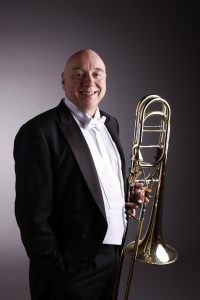
CHARLES VERNON began his orchestral career as bass trombonist with the Baltimore Symphony, starting in September 1971. In 1980 he went to the San Francisco Symphony for one season. He was then chosen by Riccardo Muti to play bass trombone with the Philadelphia Orchestra, where he played for five years until coming to the Chicago Symphony Orchestra in 1986.
A native of Asheville, North Carolina, Vernon attended Brevard College and Georgia State University, where he studied with Bill Hill as well as Gail Wilson, professor of trombone at Arizona State University. His mentor/teachers were Arnold Jacobs and Edward Kleinhammer, both former tuba and bass trombone of the Chicago Symphony.
Vernon has been on the faculties of Catholic University, Brevard Music Center, Philadelphia College of Performing Arts, Roosevelt University, and the Curtis Institute and Northwestern University. Currently he is professor of trombone at DePaul University. Vernon has many solo and teaching appearances throughout the world.
In April 1991, with the CSO under Daniel Barenboim, he gave the world premiere of Ellen Taaffe Zwilich’s Concerto for Bass Trombone, which was commissioned by the Orchestra for its centennial. In September 2006, he and the CSO premiered Chick’ a ’Bone Checkout, a new concerto for the alto, tenor and bass trombones and orchestra, written by trombonist and composer Christian Lindberg. Most recently, Chapters, an incredible bass trombone concerto by Jim Stephenson was played with Riccardo Muti and the CSO in June 2019.
Vernon and his wife, Alison, have several commissioned song cycles for soprano, trombone and piano written by the American composer Eric Ewazen and performed for many European and US audiences.
He has two sons—Mark and Gary. Mark is a video game designer with Ubisoft games developer in San Francisco and Gary is a third Dan in Tae Kwon Do and a second Dan Black Belt in Hapkido and is also an instructor at Connellys Academy for Martial Arts.
As a part-time athlete, Vernon is an avid swimmer and a member of the Evanston Masters Swim Team. He is also a first Dan Black Belt in Tae Kwon Do and he comments, “As time passes, I realize that I must keep doing it, so that I can KEEP doing it!”
The Neill Humfeld Award: David Sporny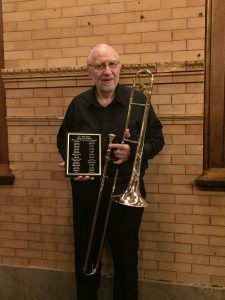
DAVID SPORNY is a performer, educator, conductor, clinician, and arranger. He is recently retired from the University of Massachusetts at Amherst where he was Professor of Trombone and conducted the Chapel Jazz Ensemble and Trombone Choir, and also performed with the Faculty Brass Quintet.
After earning his Bachelors and Masters degrees from the University of Illinois, he became the Low Brass Instructor at the Interlochen Arts Academy in Michigan. During his sixteen years at Interlochen he founded the Jazz Studies programs at the Academy and at the National Music Camp. He led the Dave Sporny Big Band and the Interlochen Jazz Quintet while being an active performer throughout the Midwest. Since coming to the University in 1982, he has been a frequent recitalist, clinician, and freelance trombonist in New England. He has conducted District and All State ensembles in fifteen states.
Being equally comfortable in both classical and jazz traditions, Mr. Sporny has appeared in concert halls throughout the world including Carnegie Hall, Lincoln Center, Kennedy Center, Tanglewood, and Ravinia. Tours with various ensembles have taken him to South America, Europe, Scandinavia, Eastern Europe, Japan, and Russia. He has performed with the Chicago Little Symphony, the Northwood Orchestra, Opera North, the Springfield and Hartford Orchestras, Ancora Chamber Ensemble, and the Corporate Brass. In 1997 he was chosen as principal trombone for the Festival Orchestra of Santa Domingo in the Dominican Republic. Most recently, as a member of the Silk Road Ensemble, he performed with Yo Yo Ma. He has also performed with The Tonight Show Orchestra, Tommy and Jimmy Dorsey Orchestras, Les Elgart, Joe Williams, Frank Sinatra Jr., Nancy Wilson, Maureen McGovern, Aretha Franklin, Andy Williams, Dave Brubeck, Marian McPartland, Max Roach, Billy Taylor, Slide Hampton, and JJ Johnson, to name a few. Dave Sporny is the founder and musical director of the Amherst Jazz Orchestra. In 2004 the International Association for Jazz Education presented him with a Lifetime Achievement Award.
David Sporny has recorded twelve albums and nineteen CDs for RCA, Brownstone, Seabreeze, Jazz Masters, and Original Cast Recordings. He is a voting member of the National Academy of Recording Arts and Sciences.
Lifetime Achievement Award: Trevor Herbert
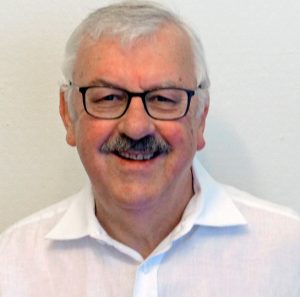
Trevor Herbert (b. 1945). Born in Cwmparc, South Wales, Trevor Herbert studied music education at St. Luke’s College, and music at University of Exeter, and the Royal College of Music, London (trombone studies with Arthur Wilson). He received a DLitt and a Ph.D. from The Open University; his Ph.D. thesis was, “The Trombone in England before 1800.” Herbert joined the faculty of The Open University in 1976 and has been Emeritus Professor since 2014. In 2009 he was made an Honorary Fellow of Leeds College of Music and the Royal College of Music; he was appointed Professor of Music Research at the Royal College in 2017. As a performer, Trevor Herbert has played trombone with numerous ensembles and on many recordings, including The Origin of the Species (Nimbus, 1996) which explored the music and instruments of the Cyfarthfa Band of Wales, a brass band in which Samuel Hughes played ophicleide.
It is in the fields of research, scholarship, and writing that Trevor Herbert has made a lasting contribution to the understanding of the trombone and the role of low brass and other instruments in culture. He serves as a member of the editorial board of the Historic Brass Society—its Journal has published many of his peer-reviewed articles—and he was a joint editor of the Cambridge Companion to Brass Instruments (Cambridge University Press, 1997) and the Cambridge Encyclopedia of Brass Instruments (Cambridge University Press, 2019). His books, The British Brass Band: A Musical and Social History (ed., Oxford University Press, 2000), Music in Words: A Guide to Researching & Writing about Music(Oxford University Press, 2009), and Music and the British Military in the Long Nineteenth Century (Oxford University Press, 2013; co-authored with Helen Barlow) have been highly praised, and his seminal volume, The Trombone (Yale University Press, 2006), is widely considered to be the most comprehensive book on the trombone, its history, and use. In recognition of his outstanding contributions, Trevor Herbert received the Historic Brass Society’s Christopher Monk Award in 2002, and the Galpin Society’s Anthony Baines Prize in 2014.
Legacy Circle Award: Keith Brown, Joannès Rochut and Russell “Big Chief” Moore
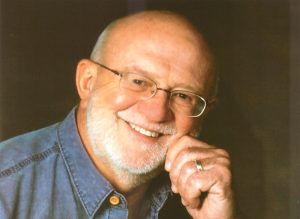 Keith Brown (1933–2018). Born in Colorado Springs, Colorado, Keith Brown began playing the trombone at the age of seven. After attending University of Southern California where he studied trombone with Robert Marsteller—Brown’s time in college was interrupted by post-Korean Conflict service in the 179th Army Band—he joined the Indianapolis Symphony in 1957 to play second trombone. After moving to New York City, he began a master’s degree at Manhattan School of Music (completed in 1964) and was a member of the New York Brass Quintet (1958–1959). Keith Brown joined the Philadelphia Orchestra’s trombone section (1959–1962) as assistant—then associate—principal trombone, and then played associate principal trombone with New York’s Metropolitan Opera Orchestra (1962–1965). In 1965, he accepted the position of Director of Instrumental Activities at Temple University, Philadelphia, where he conducted the University’s Orchestra. He subsequently left Temple to join the trombone faculty of Indiana University School of Music (1971–1997) where he also conducted orchestras and the IU contemporary chamber ensemble. Throughout his long career, Brown was widely in demand as a performer, conductor, and teacher. He served long tenures on the faculties of the Music Academy of the West (1978–1982, 1985–1987) and the Aspen Music Festival (1957–1969), was a member of the Chamber Music Society of Lincoln Center (1969–1989) and the Marlboro (Vermont) Festival (1970–1973), was principal trombone of the Casals Festival Orchestra (1958–1980), and he served as artistic director and conductor of the Camerata Orchestra of Bloomington, Indiana. In 1982, Keith Brown was the second Western trombonist to give solo recitals in China, and he recorded four albums of solo trombone music for Golden Crest and Music Minus One. Among his many lasting contributions are the more than eighty arrangements of music for trombone published by International Music Company; these include his 10-volume collection, Orchestral Excerpts for Trombone and Tuba from the Symphonic Repertoire (1962–1970).
Keith Brown (1933–2018). Born in Colorado Springs, Colorado, Keith Brown began playing the trombone at the age of seven. After attending University of Southern California where he studied trombone with Robert Marsteller—Brown’s time in college was interrupted by post-Korean Conflict service in the 179th Army Band—he joined the Indianapolis Symphony in 1957 to play second trombone. After moving to New York City, he began a master’s degree at Manhattan School of Music (completed in 1964) and was a member of the New York Brass Quintet (1958–1959). Keith Brown joined the Philadelphia Orchestra’s trombone section (1959–1962) as assistant—then associate—principal trombone, and then played associate principal trombone with New York’s Metropolitan Opera Orchestra (1962–1965). In 1965, he accepted the position of Director of Instrumental Activities at Temple University, Philadelphia, where he conducted the University’s Orchestra. He subsequently left Temple to join the trombone faculty of Indiana University School of Music (1971–1997) where he also conducted orchestras and the IU contemporary chamber ensemble. Throughout his long career, Brown was widely in demand as a performer, conductor, and teacher. He served long tenures on the faculties of the Music Academy of the West (1978–1982, 1985–1987) and the Aspen Music Festival (1957–1969), was a member of the Chamber Music Society of Lincoln Center (1969–1989) and the Marlboro (Vermont) Festival (1970–1973), was principal trombone of the Casals Festival Orchestra (1958–1980), and he served as artistic director and conductor of the Camerata Orchestra of Bloomington, Indiana. In 1982, Keith Brown was the second Western trombonist to give solo recitals in China, and he recorded four albums of solo trombone music for Golden Crest and Music Minus One. Among his many lasting contributions are the more than eighty arrangements of music for trombone published by International Music Company; these include his 10-volume collection, Orchestral Excerpts for Trombone and Tuba from the Symphonic Repertoire (1962–1970).
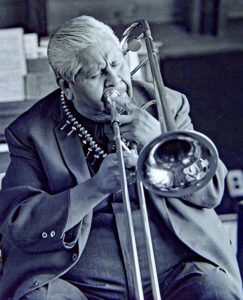 Russell “Big Chief” Moore (1912–1983). Born in Gila Crossing, Arizona—part of the Akimel O’odham (Pima) Indian reservation, what is now the Gila River Indian Community—Russell Moore learned trumpet as a youth in Arizona and trombone in Blue Island, Illinois, where he lived with his aunt and uncle after the death of his father. He was introduced to jazz by standing outside Chicago’s Savoy Ballroom—he was too young to be allowed inside the club—to hear Louis Armstrong. Moore attended high school at the Sherman Institute Indian School in Riverside, California, and played with many groups in southern California including Lionel Hampton’s band at the Cotton Club in Culver City. He settled for a time in New Orleans where he played with Oscar “Papa” Celestin’s band, and then moved to Harlem where he worked out of the Rhythm Club. He toured with the band led by trombonist Ernest Lawrence “Ernie” Fields (Moore was the only non-African American in the band) and worked with Harlan Leonard and The Rockets in Kansas City where he met and first worked with saxophonist Charlie Parker. Russell Moore played first trombone with Louis Armstrong’s Orchestra from 1945–1947 and he was the featured trombonist at the 1949 International Jazz Festival in Paris where he collaborated with Parker, Miles Davis, and Sidney Bechet. Several solo recordings followed, and Moore was a member of Louis Armstrong’s All Stars for a year, 1964–1965. Moore’s solo, “Someday,” on Armstrong’s Hello Dolly! album (Columbia), featured Armstrong introducing Moore’s playing by shouting, “Take it, Chief! Take it, Chief! Take it, Big Chief!” Despite his nickname, Russell Moore was never a Native American chief. Russell Moore came of age as a player when the bebop style was emerging, but he never embraced newer trends in jazz; he is remembered as an important exponent of traditional jazz.
Russell “Big Chief” Moore (1912–1983). Born in Gila Crossing, Arizona—part of the Akimel O’odham (Pima) Indian reservation, what is now the Gila River Indian Community—Russell Moore learned trumpet as a youth in Arizona and trombone in Blue Island, Illinois, where he lived with his aunt and uncle after the death of his father. He was introduced to jazz by standing outside Chicago’s Savoy Ballroom—he was too young to be allowed inside the club—to hear Louis Armstrong. Moore attended high school at the Sherman Institute Indian School in Riverside, California, and played with many groups in southern California including Lionel Hampton’s band at the Cotton Club in Culver City. He settled for a time in New Orleans where he played with Oscar “Papa” Celestin’s band, and then moved to Harlem where he worked out of the Rhythm Club. He toured with the band led by trombonist Ernest Lawrence “Ernie” Fields (Moore was the only non-African American in the band) and worked with Harlan Leonard and The Rockets in Kansas City where he met and first worked with saxophonist Charlie Parker. Russell Moore played first trombone with Louis Armstrong’s Orchestra from 1945–1947 and he was the featured trombonist at the 1949 International Jazz Festival in Paris where he collaborated with Parker, Miles Davis, and Sidney Bechet. Several solo recordings followed, and Moore was a member of Louis Armstrong’s All Stars for a year, 1964–1965. Moore’s solo, “Someday,” on Armstrong’s Hello Dolly! album (Columbia), featured Armstrong introducing Moore’s playing by shouting, “Take it, Chief! Take it, Chief! Take it, Big Chief!” Despite his nickname, Russell Moore was never a Native American chief. Russell Moore came of age as a player when the bebop style was emerging, but he never embraced newer trends in jazz; he is remembered as an important exponent of traditional jazz.
Russell Moore was a frequent musical ambassador for the National Conference of American Indians, and he traveled widely to indigenous communities throughout the United States to perform and speak to groups of young Native Americans. One of Moore’s last performances came in 1982 at the nationally televised “Night of the First Americans” at the Kennedy Center in Washington, D.C., where he played his own composition, Chant for Wounded Knee.
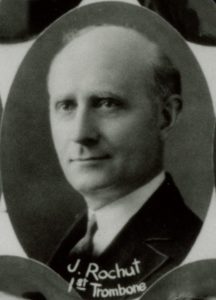 Joannès Rochut (1881–1952). Born in Paris, Rochut’s father died when he was seven years old and he was placed in an orphanage where he learned to play the trombone. After volunteering for the French military when he was eighteen—he served as a bandsman for three years—Rochut enrolled in the Paris Conservatoire in 1902 where he studied with Louis Allard (1852–1940). Rochut graduated in 1905 with first prize in the annual Concours; the required solo was Zygmunt Denis Antoni Jordan “Sigismond” de Stojowski’s Fantasie. Rochut had won second prize in 1903, playing Bernard Croce-Spinelli’s Solo de concours, and second prize again in 1904, playing Morceau de concours of Edmond J. Missa. While a member of the Orchestre de la Garde républicaine (French Republican Guard Band) during World War I, Rochut toured the United States; the band played concerts in 208 cities in 37 states. Following his military service, Rochut performed with numerous orchestras in France including the Société des Nouveaux-Concerts (Orchestre Lamoureux) and l’Opera Comique (Paris). Among his many students at that time was Andre Lafosse (1890–1975), who later served as professor of trombone at the Paris Conservatoire (1948–1960). Rochut also helped organize the first of the Concerts Koussevitzky (1921, Paris) which were instrumental in establishing the reputation of Russian conductor Serge Koussevitzky (1897–1951). Koussevitzky was appointed music director of the Boston Symphony Orchestra in 1924 and in 1925, he engaged Rochut as the orchestra’s principal trombonist, a position he held for five seasons. Rochut joined the faculty of New England Conservatory of Music in 1926. Among his students in Boston was John Coffey (bass trombonist of the Cleveland Orchestra 1937–1941, and bass trombonist of the Boston Symphony, 1941–1952). During his early years with the Boston Symphony, Rochut played a trombone manufactured by Lefevre (Paris, c. 1912) with a small, funnel shaped mouthpiece; the instrument had a .450” bore, and six-inch bell diameter. While he endorsed the Holton Revelation trombone in Holton’s 1920 catalog and used a Besson trombone for a time in 1927–1928, he purchased one of the first trombones made by Vincent Bach on November 22, 1929 (.514/.525” bore, an eight-inch bell diameter, serial number 0023) and left his Lefevre trombones in Boston when he returned to Paris in 1930. Rochut played the trombone solo on one of the earliest recordings of Maurice Ravel’s Bolero (Koussevitzy/Boston Symphony, RCA Victor, 1930).
Joannès Rochut (1881–1952). Born in Paris, Rochut’s father died when he was seven years old and he was placed in an orphanage where he learned to play the trombone. After volunteering for the French military when he was eighteen—he served as a bandsman for three years—Rochut enrolled in the Paris Conservatoire in 1902 where he studied with Louis Allard (1852–1940). Rochut graduated in 1905 with first prize in the annual Concours; the required solo was Zygmunt Denis Antoni Jordan “Sigismond” de Stojowski’s Fantasie. Rochut had won second prize in 1903, playing Bernard Croce-Spinelli’s Solo de concours, and second prize again in 1904, playing Morceau de concours of Edmond J. Missa. While a member of the Orchestre de la Garde républicaine (French Republican Guard Band) during World War I, Rochut toured the United States; the band played concerts in 208 cities in 37 states. Following his military service, Rochut performed with numerous orchestras in France including the Société des Nouveaux-Concerts (Orchestre Lamoureux) and l’Opera Comique (Paris). Among his many students at that time was Andre Lafosse (1890–1975), who later served as professor of trombone at the Paris Conservatoire (1948–1960). Rochut also helped organize the first of the Concerts Koussevitzky (1921, Paris) which were instrumental in establishing the reputation of Russian conductor Serge Koussevitzky (1897–1951). Koussevitzky was appointed music director of the Boston Symphony Orchestra in 1924 and in 1925, he engaged Rochut as the orchestra’s principal trombonist, a position he held for five seasons. Rochut joined the faculty of New England Conservatory of Music in 1926. Among his students in Boston was John Coffey (bass trombonist of the Cleveland Orchestra 1937–1941, and bass trombonist of the Boston Symphony, 1941–1952). During his early years with the Boston Symphony, Rochut played a trombone manufactured by Lefevre (Paris, c. 1912) with a small, funnel shaped mouthpiece; the instrument had a .450” bore, and six-inch bell diameter. While he endorsed the Holton Revelation trombone in Holton’s 1920 catalog and used a Besson trombone for a time in 1927–1928, he purchased one of the first trombones made by Vincent Bach on November 22, 1929 (.514/.525” bore, an eight-inch bell diameter, serial number 0023) and left his Lefevre trombones in Boston when he returned to Paris in 1930. Rochut played the trombone solo on one of the earliest recordings of Maurice Ravel’s Bolero (Koussevitzy/Boston Symphony, RCA Victor, 1930).
Joannès Rochut is especially remembered for the three volumes of Melodious Etudes he arranged from the Vocalises of the Italian singer and pedagogue Giulio Marco Bordogni (1789–1856). These were published (without piano accompaniment) in 1928 by Carl Fischer, New York and have remained continuously in print since that time. They are among the most influential books ever published for brass instruments. Rochut also edited many other publications, including twelve of Johann Sebastian Bach’s Two-Part Inventions (originally for piano, Antoine Courtois, 1914), and the Adagio Cantabile of Pietro Nardini (originally for violin, Evette & Schaeffer, c. 1923).